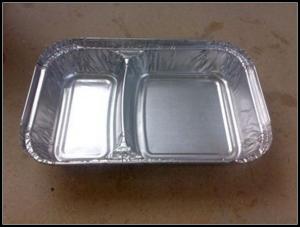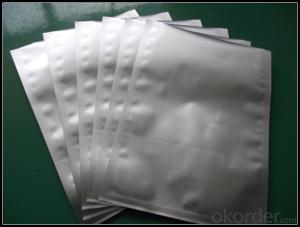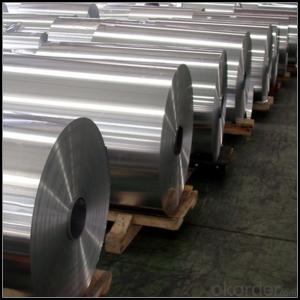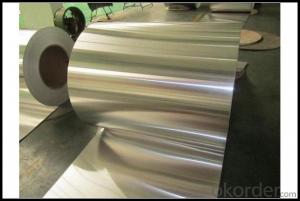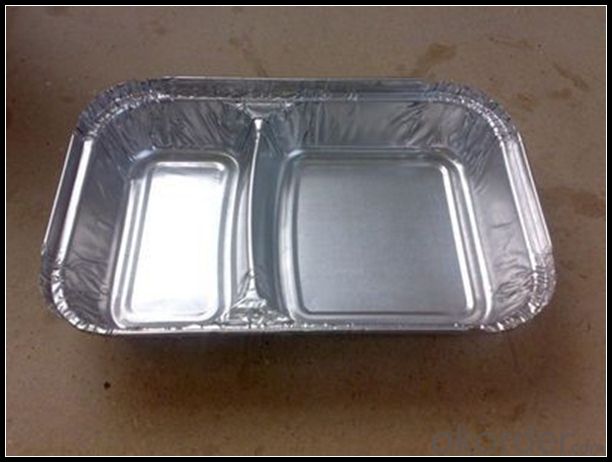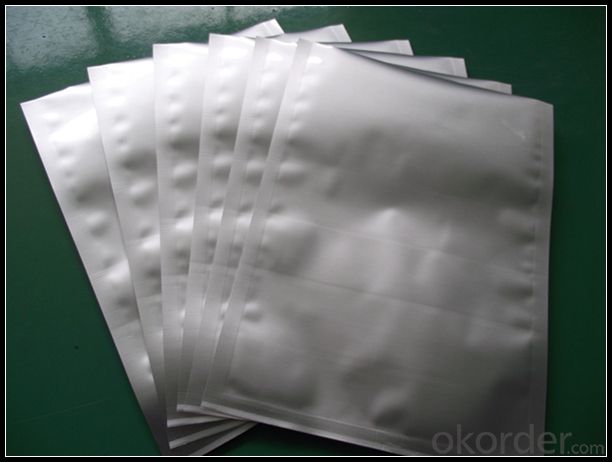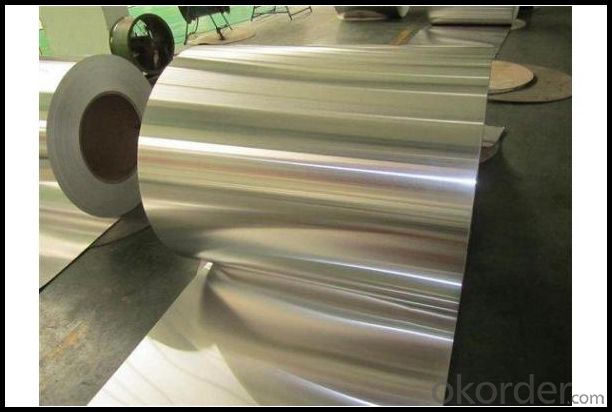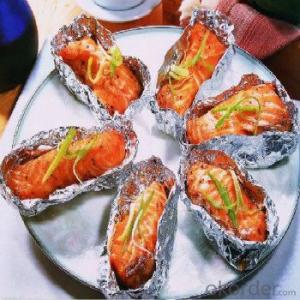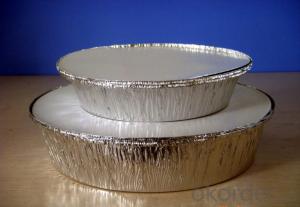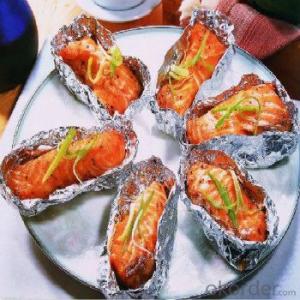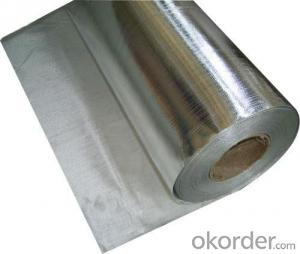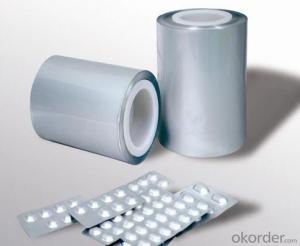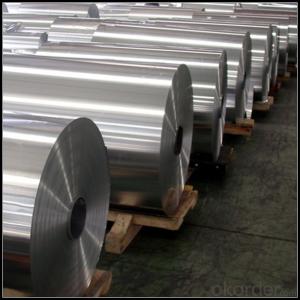Aluminum Coil Price:AA8011/AA1235 Aluminum Foil for Food Packaging/Container
- Loading Port:
- Dalian
- Payment Terms:
- TT OR LC
- Min Order Qty:
- 5 m.t.
- Supply Capability:
- 2000 m.t./month
OKorder Service Pledge
OKorder Financial Service
You Might Also Like
Specification
1. Specification of Aluminum Foil
Thickness | 0.005mm-0.2mm |
Popular Thickness | 0.01mm/0.02mm/0.025mm/0.03mm/0.006mm/0.008mm |
Width | 20mm-2500mm |
inner diameter | 76mm / 152mm |
Material | AA1050, AA1060, AA1070, AA1100, AA1235, AA3003, AA3004, AA3005, AA3104, AA3105, AA5052, AA5005, AA5754, AA5083, AA8011, AA8006,AA8079, etc |
Temper | O,H12,H14,H16,H18,H22,H24,H26, H28, H32,H34,H36,H38 and so on |
Surface | Mill finish / Coated/ Embossed |
Packing | Export standard wooden pallets |
Payment Terms | 100% irrevocable L/C at sight or 30% T/T in advance as deposit,70% balance against the B/L copy |
Minimum Order Quantity | 5MT |
Delivery time | 30-35 days after the receiving L/C or deposit |
2. Applications of Aluminum Foil
(1) Interior: wall cladding, ceilings, bathrooms, kitchens and balconies, shutters, doors, windows,
(2) Exterior: wall cladding, facades, roofing, canopies, tunnels,column covers , renovations.
(3).Advertisement: display platforms, signboards, fascia, shop fronts.
3. Features of Aluminum Foil
*Such coil is specially designed to replace aluminum ingot, due to the high export tax of aluminum ingot, the coil has better price than ingot.
*This type of coil can fit customer's remelting furnace just like ingot, no need to make any change to the production line that was previously used for ingot. The standard coil size and weight is very suitable for the feed gate of furnace.
*This type of coil causes less material wastage than ingot when remelted.
*Our coil is made directly from ore, no need to go though the ingot making process, quality is much better than other suppliers who use ingot scrap to make coil.
Be free from Oil Stain, Dent, Inclusion, Scratches, Stain, Oxide Dicoloration, Breaks, Corrosion, Roll Marks, Dirt Streaks and other defect which will interfere with use
4. Certificates:
SGS and ROHS (if clients request, paid by client), MTC (plant provided), Certificate of Origin (FORM A, FORM E, CO), Bureau Veritas (if client request, paid by client), CIQS certificate and so on.
5. Images of Aluminum Foil
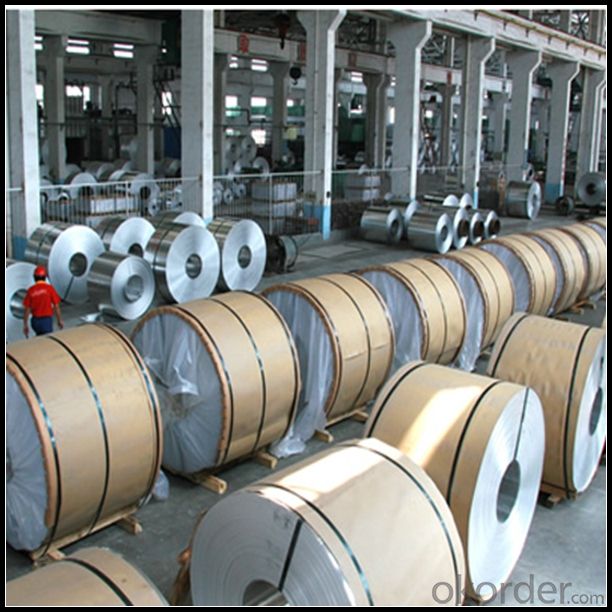
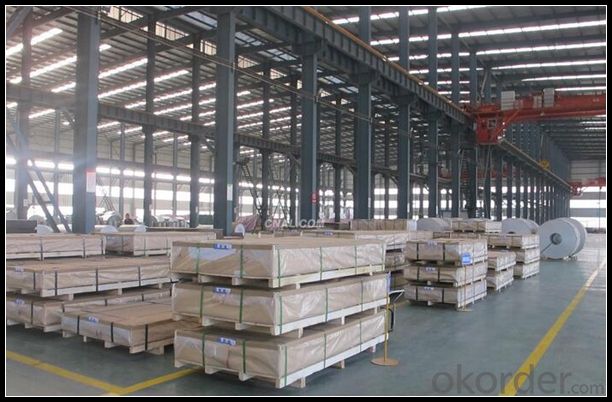
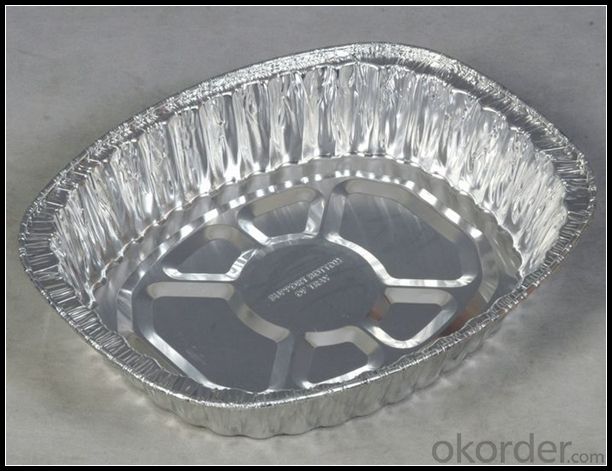
6. About Us
CNBM Group is short for China National Building Materials Group Corporation, which is established in 1984 with approval from the State Council
CNBM Group is the largest comprehensive building materials industry group in China
The Group has a total asset of over RMB 360 billion, more than 180,000 employees and 17 subsidiaries
CNBM International Corp., establishedin 2004, is the business entity for trade and logistic of CNBM Group.
CNBM International is highly recognizedby its business partners and clients all over the world and has establishedgood business relationship with the customers in over 160 countries and regionsall over the
world.
7. FAQ
1) What is the delivery time?
Depends on actual order, around 30 to 35 days
2) What is the QC system?
We have QC staff of 30 persons and advanced equipment, each production is with MTC traced from Aluminum ingot lot.
3) What market do you mainly sell to?
Australia, America, Asia, Middle East, Western Europe, Africa etc
- Q: Can aluminum coils be welded or joined?
- Yes, aluminum coils can be welded or joined. Aluminum is a highly weldable metal and can be easily joined using various welding techniques. The most common methods of welding aluminum coils include TIG (Tungsten Inert Gas) welding, MIG (Metal Inert Gas) welding, and resistance welding. TIG welding is a precise and versatile technique that uses a non-consumable tungsten electrode to create the arc. It is widely used for welding aluminum coils as it provides excellent control over the welding process, ensuring high-quality and strong welds. MIG welding, on the other hand, uses a consumable wire electrode and a shielding gas to protect the weld zone from atmospheric contamination. This method is faster than TIG welding and is often preferred for larger production runs. Resistance welding is another common method used to join aluminum coils. It involves passing an electric current through the overlapping metal surfaces to create heat and pressure, resulting in a strong weld joint. This technique is often used in industries where high-speed production is required. It is worth noting that welding aluminum coils requires specific techniques and considerations due to the metal's unique properties. Aluminum has a lower melting point and higher thermal conductivity compared to other metals, which can make it more challenging to weld. Proper cleaning, preheating, and selection of appropriate filler materials are crucial for achieving successful welds. In summary, aluminum coils can be welded or joined using various techniques such as TIG welding, MIG welding, and resistance welding. However, it is essential to follow proper procedures and consider the specific properties of aluminum to ensure strong and reliable welds.
- Q: Can aluminum coils be used for electrical conductors?
- Yes, aluminum coils can be used for electrical conductors. Aluminum is a good conductor of electricity and is commonly used in various electrical applications due to its high conductivity, lightweight nature, and cost-effectiveness.
- Q: What are the different mechanical properties of aluminum coils?
- Aluminum coils are highly sought after for a variety of uses due to their diverse mechanical properties. Some key properties of aluminum coils include: 1. Strong: Aluminum coils are impressively strong, making them suitable for structural purposes. Their strength can be further enhanced through alloying or heat treatment processes. 2. Flexible: Aluminum coils are highly malleable, allowing for easy shaping and forming. This property enables the creation of intricate designs and complex shapes without compromising the integrity of the material. 3. Lightweight: Aluminum is known for its low density, making it one of the lightest metals available. This characteristic makes aluminum coils ideal for industries like aerospace and automotive, where weight reduction is crucial. 4. Resistant to corrosion: Aluminum naturally resists corrosion, forming a protective oxide layer that prevents further oxidation. This quality makes aluminum coils suitable for outdoor and marine environments, as they can withstand harsh conditions and require minimal maintenance. 5. Good conductivity: Aluminum is an excellent conductor of both heat and electricity. This characteristic makes aluminum coils ideal for applications that require efficient heat transfer, such as in heat exchangers and electrical wiring. 6. Easy to machine: Aluminum coils can be easily machined due to their low melting point and the way they form chips. This characteristic allows for high-speed machining operations, resulting in reduced production time and costs. 7. Weldable: Aluminum coils can be easily welded using various techniques, such as TIG or MIG welding. This characteristic enables the fabrication of complex structures and the joining of aluminum components. 8. Resistant to fatigue: Aluminum exhibits excellent fatigue resistance, allowing it to withstand repeated stress cycles without failure. This quality makes aluminum coils suitable for applications subjected to cyclic loading, such as automotive components or structures exposed to wind or waves. Overall, the combination of unique mechanical properties possessed by aluminum coils, including strength, flexibility, lightweight, corrosion resistance, conductivity, machinability, weldability, and fatigue resistance, makes them a versatile material choice for a wide range of industries and applications.
- Q: How are aluminum coils protected against mechanical damage?
- To safeguard aluminum coils from mechanical harm, multiple methods are employed. One of the primary techniques involves the application of a protective coating or finish to the coil's surface. This coating acts as a shield, preventing any potential sources of mechanical damage, such as impact or abrasion, from affecting the coil. The coating itself can either be a standard paint or a specialized aluminum coating, offering enhanced durability and resistance to scratching or denting. Apart from the protective coating, aluminum coils may also undergo reinforcement with an additional layer of laminate or film. This supplementary layer provides an extra level of defense against mechanical damage, effectively warding off dents or scratches. The application of the laminate or film can occur during the manufacturing process or as a separate step following coil production. Furthermore, to minimize the risk of mechanical damage during transportation or storage, aluminum coils can be wrapped or packaged in protective materials like plastic or foam. These wrappings serve to cushion the coil and create a barrier against potential impacts or heavy objects that could cause damage. In conclusion, a combination of protective coatings, laminates, and packaging materials ensures the adequate protection of aluminum coils from mechanical harm. These measures are instrumental in preserving the integrity and quality of the coils, enabling them to effectively fulfill diverse applications.
- Q: What is the acceptable range of temperatures for aluminum coils in terms of their functionality and durability?
- <p>The temperature range for aluminum coils can vary depending on the specific application and alloy type. Generally, aluminum coils can operate effectively within a range of -200掳F to 500掳F (-129掳C to 260掳C). For most industrial applications, the working temperature is between -40掳F to 300掳F (-40掳C to 150掳C). However, it's important to consult the manufacturer's specifications for the exact temperature limits of a particular aluminum coil, as these can differ based on the alloy and intended use.</p>
- Q: Is it possible to utilize a press machine to bend aluminum coils?
- <p>Yes, you can use a press to bend aluminum coils. Presses are versatile machines capable of bending various materials, including aluminum. However, it's crucial to select the appropriate press type and size for the specific coil dimensions and desired bend. Additionally, ensure the press has the necessary tonnage to handle the bending force required for aluminum. Using the right dies and lubrication can also improve the bending process and prevent damage to the coils. Always follow safety guidelines and consult with equipment specifications to ensure the press is suitable for bending aluminum.</p>
- Q: What are the common surface treatments for aluminum coils in the construction industry?
- Aluminum coils are widely used in the construction industry due to their lightweight, durability, and corrosion resistance. To improve their performance and appearance, various surface treatments are applied. In the construction industry, there are several common surface treatments for aluminum coils: 1. Anodizing is a widely used method that involves creating an oxide layer on the aluminum surface. This process enhances corrosion resistance, improves weather resistance, and provides coloring options. 2. Powder coating is a popular technique where a dry powder is applied electrostatically and then cured under heat. This results in a durable, smooth, and attractive finish that is resistant to chipping, fading, and scratching. 3. PVDF coating is a high-performance option that offers excellent weather resistance and color retention. It is commonly used in architectural applications where long-term durability and aesthetic appeal are desired. 4. Paint coating, using liquid paint, provides a wide range of color options and finishes. These coatings offer good corrosion resistance and can be tailored to specific design requirements. 5. Brushed finish is achieved by brushing the aluminum surface, creating a textured appearance. This process can be done mechanically or chemically, enhancing the aesthetic appeal of the coils. 6. Laminating involves applying a layer of protective film or laminate to the aluminum coil. This safeguards the coil from scratches, stains, and other damage during handling, transportation, and installation. These surface treatments not only enhance the durability and performance of aluminum coils but also offer customization options. Architects and designers can achieve their desired aesthetics while ensuring long-lasting performance in construction applications.
- Q: How do aluminum coils compare to other materials in terms of strength?
- Aluminum coils are known for their remarkable strength-to-weight ratio, making them highly competitive compared to other materials. While aluminum may not be as strong as certain metals like steel or titanium, it still possesses sufficient strength to meet the demands of various applications. The specific strength of aluminum coils refers to their strength relative to their weight, which is often superior to other materials. Additionally, aluminum coils offer exceptional corrosion resistance, which further enhances their durability and longevity. Although there may be stronger materials available, aluminum coils remain an excellent choice for many industries due to their favorable strength characteristics and numerous other benefits.
- Q: This question asks for the current prices of aluminum coils, which may vary based on factors such as weight, thickness, and market conditions.
- <p>The prices of aluminum coils can vary significantly depending on several factors including weight, thickness, grade, and market demand. Prices are also influenced by global economic conditions and the current state of the commodities market. As of my last update, aluminum coil prices could range from a few dollars to several hundred dollars per pound, but for the most accurate and up-to-date pricing, it's best to check with a supplier or a commodities exchange, as these prices fluctuate regularly.</p>
- Q: What are the weight considerations when using aluminum coils?
- When using aluminum coils, there are several weight considerations to take into account. Firstly, aluminum coils are generally lighter in weight compared to other metals, such as steel. This makes them a popular choice in industries where weight reduction is a priority, such as automotive manufacturing or aerospace applications. The lightweight nature of aluminum coils allows for improved fuel efficiency in vehicles and increased payload capacity in airplanes. Secondly, the weight of the aluminum coil itself is important to consider. Depending on the specific application, the weight of the coil may need to be within certain limits to ensure proper functioning and structural integrity. For example, in HVAC systems, the weight of the aluminum coil needs to be suitable for the unit to be mounted securely and able to withstand vibrations or pressure changes. Additionally, the weight of the aluminum coil can impact transportation and installation. Lighter coils are easier to handle, transport, and install, reducing the time and effort required for these processes. This can be particularly advantageous in construction projects where large quantities of aluminum coils are used. It is also crucial to consider the weight-bearing capacity of the structures or equipment that will be supporting or utilizing the aluminum coils. The weight of the coils, combined with any additional components or materials, should not exceed the load capacity of the system to avoid structural failure or safety hazards. Lastly, the weight of aluminum coils can affect cost considerations. Since aluminum is typically priced based on weight, lighter coils may be more cost-effective compared to heavier alternatives. However, it is important to strike a balance between weight reduction and meeting the required performance and strength specifications. In conclusion, weight considerations when using aluminum coils encompass factors such as the overall weight reduction benefits, the weight of the coil itself, transportation and installation ease, load-bearing capacity, and cost implications. Taking these considerations into account ensures the successful and efficient utilization of aluminum coils in various industries and applications.
Send your message to us
Aluminum Coil Price:AA8011/AA1235 Aluminum Foil for Food Packaging/Container
- Loading Port:
- Dalian
- Payment Terms:
- TT OR LC
- Min Order Qty:
- 5 m.t.
- Supply Capability:
- 2000 m.t./month
OKorder Service Pledge
OKorder Financial Service
Similar products
Hot products
Hot Searches
Related keywords
